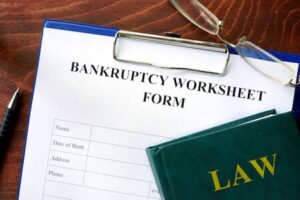
Bankruptcy is an effective means of wiping out debt. But not all debts are eligible for “discharge” in the bankruptcy process. It is possible that you will remain several thousands of dollars in debt even going through bankruptcy. For this reason, it is important that you meet with a Toledo bankruptcy attorney to review your debts and determine which you can eliminate.
Secured Debts
Every secured debt has two parts—a debt you personally owe and a security agreement where you pledge collateral in the event you default. Technically, you can eliminate the personal debt in bankruptcy. However, you cannot get rid of the security agreement. Consequently, your creditor can still seize the collateral if you don’t pay—so it doesn’t make sense to say you can “eliminate” secured debts.
The most common secured debts are car loans and home mortgages. Many people hope to eliminate their mortgage in bankruptcy but keep their home, but that is not possible. Instead, you will need to reaffirm your loan, which means it survives bankruptcy. Otherwise, you can give up the collateral.
For a free legal consultation, call (419) 930-3030
Child Support & Alimony Debts
If you fell behind on these domestic support obligations, you cannot eliminate them in bankruptcy. Any past-due payments are called “arrearages,” and you will still owe them even after the bankruptcy process. Congress identified these debts as “non-dischargeable” in 11 U.S.C. § 523(5).
Of course, you can still use bankruptcy to help with these debts. If you file Chapter 13, for example, you can spread out your arrearages over the course of your payment plan and avoid wage garnishment. But you can’t eliminate them.
Personal Injury Lawyer Near Me (419) 930-3030
Most Taxes
The government wants taxpayers to pay up, so the bankruptcy code makes most taxes non-dischargeable. You can’t get rid of them.
An exception exists for certain income taxes only. They must meet a long list of conditions, such as:
- The taxes are more than 3 years old
- You timely filed your returns or filed for the relevant tax year at least 2 years ago
- You did not commit tax fraud or evasion
- The IRS assessed the debt more than 240 days before you filed for bankruptcy
Payroll taxes and tax penalties are not eligible for discharge. Debtors must also realize they cannot eliminate a tax lien that is already in place. Instead, they will need to pay off the lien to get it removed.
Some Court Judgments
A court judgment against you is a debt you must repay. You can eliminate some court judgments in bankruptcy—but not all. For example, the code states that any penalty or judgment based on drunk driving is non-dischargeable.
With other court judgments, it depends on the actions your creditor takes. He or she would have to file an adversary proceeding with the court to object to the discharge. This might happen if your judgment is for an injury caused by fraud or malicious acts.
Complete a Free Case Evaluation form now
Student Loans
For now, student loans are difficult to eliminate in bankruptcy. Basically, you will need to show that paying them back is an “undue hardship” by showing the following:
- You can’t maintain a minimal standard of living and pay your debts at the same time
- This financial situation will exist for most of the repayment period
- You have made a good faith effort to pay back the loans
For example, you might be disabled and unable to find full-time employment. If your loans eat up most of your disability check, then they are a hardship.
Let Us Review Your Debt
At Groth & Associates, we perform a full review of all debt to determine whether bankruptcy is right for you. Contact us today to schedule a free consultation.
Call or text (419) 930-3030 or complete a Free Case Evaluation form


